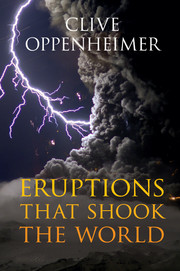Book contents
- Frontmatter
- Contents
- Preface
- Acknowledgements
- 1 Fire and brimstone: how volcanoes work
- 2 Eruption styles, hazards and ecosystem impacts
- 3 Volcanoes and global climate change
- 4 Forensic volcanology
- 5 Relics, myths and chronicles
- 6 Killer plumes
- 7 Human origins
- 8 The ash giant/sulphur dwarf
- 9 European volcanism in prehistory
- 10 The rise of Teotihuacán
- 11 Dark Ages: dark nature?
- 12 The haze famine
- 13 The last great subsistence crisis in the Western world
- 14 Volcanic catastrophe risk
- Appendix A Large eruptions
- Appendix B Further reading and data sources
- References
- Index
7 - Human origins
Published online by Cambridge University Press: 01 June 2011
- Frontmatter
- Contents
- Preface
- Acknowledgements
- 1 Fire and brimstone: how volcanoes work
- 2 Eruption styles, hazards and ecosystem impacts
- 3 Volcanoes and global climate change
- 4 Forensic volcanology
- 5 Relics, myths and chronicles
- 6 Killer plumes
- 7 Human origins
- 8 The ash giant/sulphur dwarf
- 9 European volcanism in prehistory
- 10 The rise of Teotihuacán
- 11 Dark Ages: dark nature?
- 12 The haze famine
- 13 The last great subsistence crisis in the Western world
- 14 Volcanic catastrophe risk
- Appendix A Large eruptions
- Appendix B Further reading and data sources
- References
- Index
Summary
‘Roughness’, generated by tectonic and volcanic movement characterises not only the African rift valley but probably the whole route of early hominid dispersal.
G. King and G. Bailey, Antiquity (2006) [109]Over the last two million or so years, Earth has experienced tremendous climatic swings forced principally by subtle changes in the planet's axial rotation and orbit around the Sun. The last peak in glaciation was roughly 23,000 years ago, with a return to temperate conditions 11,500 years ago. The glacial periods were often associated with severe aridity in eastern Africa, drastically altering the composition of ecosystems and geographical ranges of human and other species. On the other hand, the warm intervening periods witnessed expansion of savannah, woodlands and lakes. Any attempt to understand human origins and evolution has to take account of this oscillating climate and its associated ecological and physical impacts (including waxing and waning of ice sheets and changing sea level).
An important question is: why does eastern Africa figure so prominently in the story of human evolution? And why, in particular, the East African Rift Valley? Some geologists and archaeologists argue that tectonic and volcanic activity might be the answer. They suggest that continuous rejuvenation of the rift by eruptions and earthquake faulting provided a unique geological driver for human origins and evolution.
There are many unresolved puzzles in palaeoanthropology in part because the human fossil record is so patchy. New hominin finds can abruptly overturn prior consensus.
- Type
- Chapter
- Information
- Eruptions that Shook the World , pp. 166 - 180Publisher: Cambridge University PressPrint publication year: 2011



